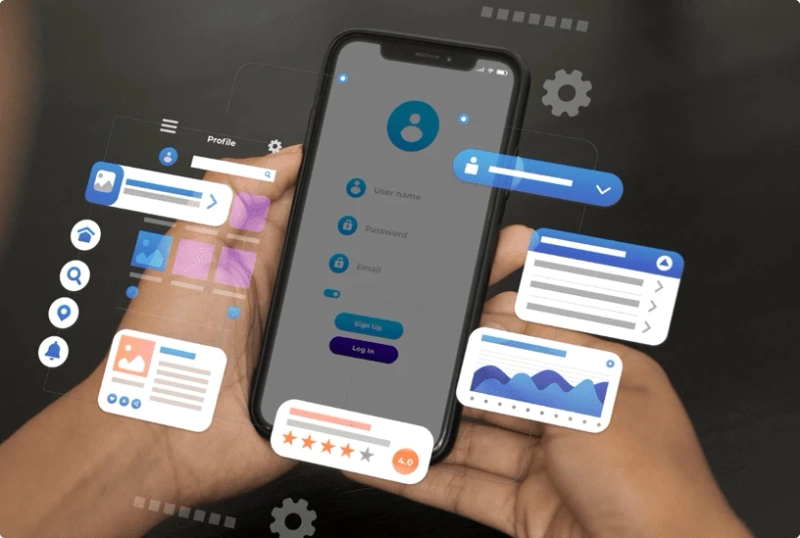In the world of mobile app development, two primary approaches dominate: Native App Development and Cross-Platform Development. Both come with their unique advantages and limitations, and deciding which one is best for your project can be a crucial decision. This blog will break down the key differences, advantages, and considerations of each approach to help you make an informed choice.
What is Native App Development?
Native app development refers to building applications specifically for a particular platform, such as iOS or Android, using platform-specific programming languages and tools. For example, iOS apps are typically built using Swift or Objective-C, while Android apps are developed using Java or Kotlin. These apps are compiled directly into machine code, making them highly optimized for their respective platforms.
Advantages of Native App Development
- Performance: Native apps generally offer superior performance compared to cross-platform apps. Since they are optimized for a specific operating system, they can take full advantage of the device’s hardware capabilities, leading to faster load times, smoother animations, and better overall performance.
- User Experience: Native apps provide a more polished and seamless user experience. They adhere to the design guidelines and patterns set by the platform, ensuring that the app feels like a natural extension of the device’s operating system. This leads to higher user satisfaction and engagement.
- Access to Platform-Specific Features: Native development gives developers full access to the features and APIs offered by the platform, such as camera controls, GPS, and sensors. This is crucial for apps that rely heavily on specific device functionality, such as gaming or augmented reality apps.
- Better Offline Capabilities: Native apps tend to perform better offline or with limited connectivity. Since they are fully integrated into the device, they can handle local storage and caching more efficiently, ensuring that users can still access key features even without an internet connection.
Disadvantages of Native App Development
- Development Time and Cost: Native apps require separate development for each platform, which can lead to longer development times and higher costs. If you're targeting both iOS and Android, you essentially need two separate codebases and teams of developers, which can significantly increase your budget.
- Maintenance: Maintaining two separate codebases can also increase the complexity of updates and bug fixes. Changes made to one platform need to be manually mirrored on the other, which can introduce delays in releasing updates.
What is Cross-Platform Development?
Cross-platform development involves creating a single codebase that can run on multiple platforms (iOS, Android, etc.). Frameworks like React Native, Flutter, and Xamarin allow developers to write the application once and deploy it on both iOS and Android devices. While the user interface may still be tailored for each platform, much of the core functionality remains consistent across devices.
Advantages of Cross-Platform Development
- Cost-Effectiveness: One of the main advantages of cross-platform development is the cost savings. By using a single codebase, you eliminate the need to develop separate apps for iOS and Android, thus reducing development time and costs.
- Faster Time to Market: With a unified codebase, updates and features can be rolled out to both platforms simultaneously, making the development cycle much quicker. This is particularly beneficial for startups and businesses looking to launch their product in the market as soon as possible.
- Consistent User Experience: Since cross-platform frameworks aim to provide a consistent experience across all platforms, your app will look and function similarly whether it is running on iOS or Android. This consistency can be valuable if you're targeting a broad audience and want to maintain brand identity.
- Easier Maintenance: Managing one codebase for multiple platforms simplifies maintenance and updates. Bug fixes, feature additions, or performance improvements can be implemented once and applied across both iOS and Android, reducing the time and effort required for updates.
Disadvantages of Cross-Platform Development
- Performance Issues: Cross-platform apps often don't perform as well as native apps because they rely on a bridge between the app and the platform's native code. This can result in slower speeds, lower responsiveness, and fewer optimizations, particularly for complex applications like games or high-performance tools.
- Limited Access to Native Features: While cross-platform frameworks are constantly improving, there may still be limitations when it comes to accessing certain device-specific features. Some native functionality may require writing platform-specific code or using plugins, which could complicate development.
- Inconsistent User Experience: While cross-platform tools aim to provide a consistent user experience, it can sometimes feel less "native" compared to a dedicated app built specifically for a platform. Additionally, you might need to tweak certain UI elements for each platform, which could defeat some of the cost-saving benefits.
- Limited Community and Support: Some cross-platform tools may have smaller developer communities compared to native development. This can lead to fewer resources, libraries, and third-party integrations, which might slow down development or force you to build custom solutions.
Which One is Right for Your Project?
Deciding between native and cross-platform development depends largely on your project’s goals, budget, and timeline.
- Choose Native App Development if:
- You require high performance or resource-intensive features (e.g., gaming, AR/VR, advanced camera functionality).
- You need full access to platform-specific APIs or want to provide a highly optimized user experience.
- You have the budget and time to develop and maintain separate codebases for each platform.
- Choose Cross-Platform Development if:
- You need to launch on both iOS and Android quickly and with a unified codebase.
- Your app doesn’t require extremely high performance or complex native functionalities.
- You want to minimize development costs and maintain a single codebase for easier updates.
In conclusion, both native and cross-platform development have their place in the world of mobile app creation. Native development excels in performance and user experience, while cross-platform development is more cost-effective and quicker to market. Understanding your project’s specific requirements will guide you toward the best solution.


